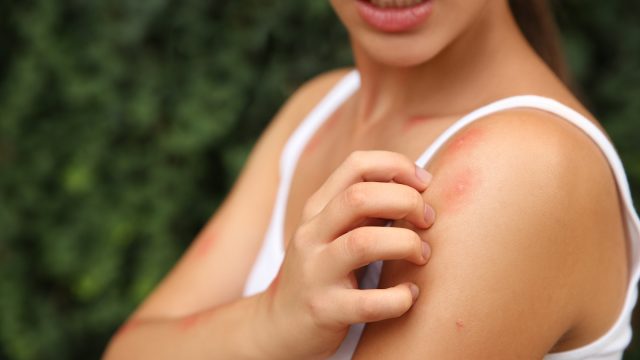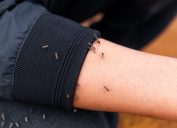7 Household Items That Will Take the Itch Out of Mosquito Bites
Stop itchy mosquito bites with these clever home remedies.
Summer has arrived, and with it, so has a steady stream of mosquitoes. But just because these pests are out buzzing and biting doesn't mean you have to endure the welts they leave behind—in fact, experts say there are plenty of household items that can take the itch out of mosquito bites.
Emma Grace Crumbley, an entomologist for Mosquito Squad, explains that these bug bites itch because mosquitoes pump a small amount of saliva into the tiny wound they create in your skin.
"Because the saliva is a foreign substance in the body (in addition to the small puncture hole the mosquito bite leaves), your body's immune system works to fight against the alien threat. This results in an itchy, red, raised bump forming wherever the mosquito bit you," she tells Best Life.
The good news? While it may be a challenge to stop the bugs from biting, there are several ways to take the itch out of mosquito bites after they occur by calming that inflammatory reaction. Read on to find out what six things you probably already have in your house that will provide fast relief.
READ THIS NEXT: 5 Plants That Will Keep Mosquitoes Out of Your Yard, According to Pest Experts.
1
Baking soda-based toothpaste
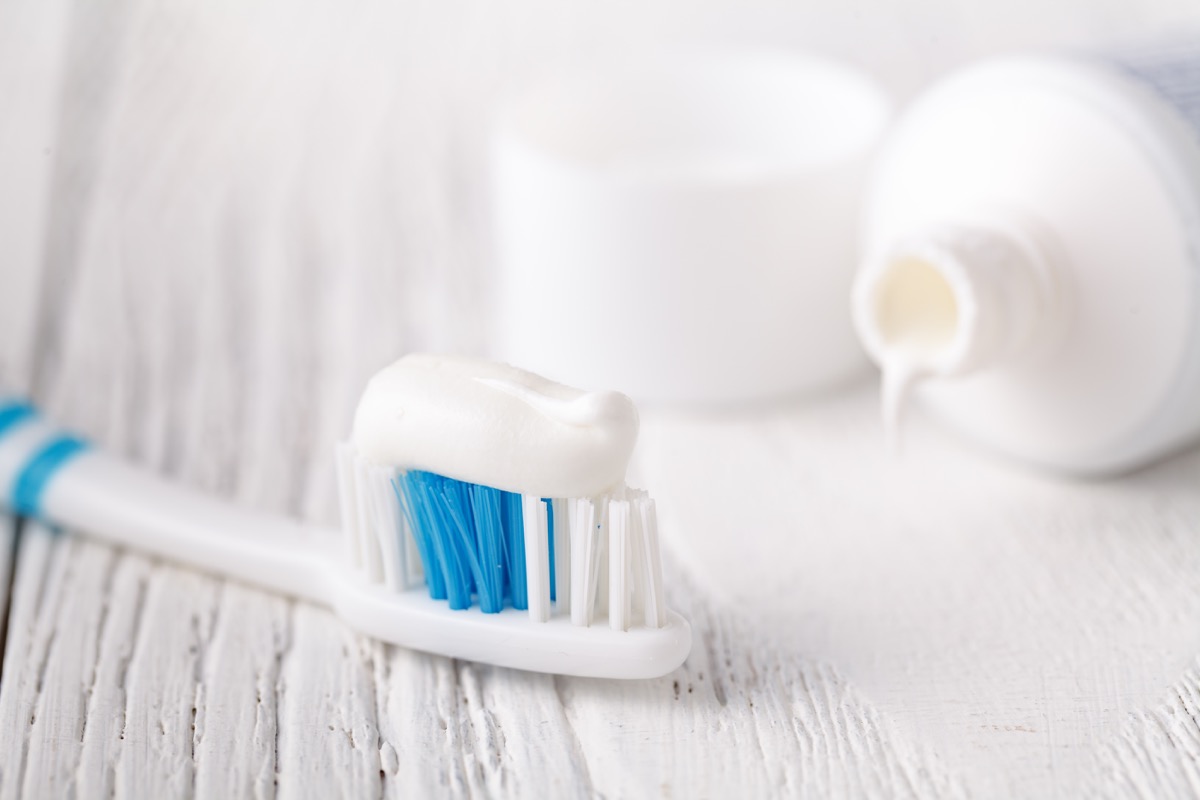
Nicole Jaques, a blogger and influencer who regularly posts lifestyle hacks, recently shared on TikTok that baking soda-based toothpaste can help take the itch out of mosquito bites.
"A dab of toothpaste on the bite will act as an astringent, and the menthol in the toothpaste will also provide a 'cooling' sensation," she notes in the video's caption.
This aligns with research suggesting that baking soda has an anti-inflammatory effect on the skin and can help relieve itch in those with eczema.
Shara Cohen, PhD, founder of Mums in Science, tells Best Life that baking soda is also effective at relieving itchy skin because of its alkalizing, pH-balancing properties.
2
Deodorant

Antiperspirant deodorants can also be an effective tool in the fight against itchy mosquito bites, says Jaques.
"The aluminum salts in the antiperspirant help the body to reabsorb the fluid in the bug bite, so the swelling goes down and the itch goes away," she explains.
Doctors have corroborated this theory, saying that carrying roll-on deodorants with you during mosquito season can provide easy relief for bites.
"It contains aluminum chloride and it will stop the pain and the swelling," Steven Garner, MD, emergency medicine specialist at New York Methodist Hospital, explained while speaking with NBC News.
READ THIS NEXT: 4 Soaps and Scents That Repel Mosquitoes, Experts Say.
3
Honey
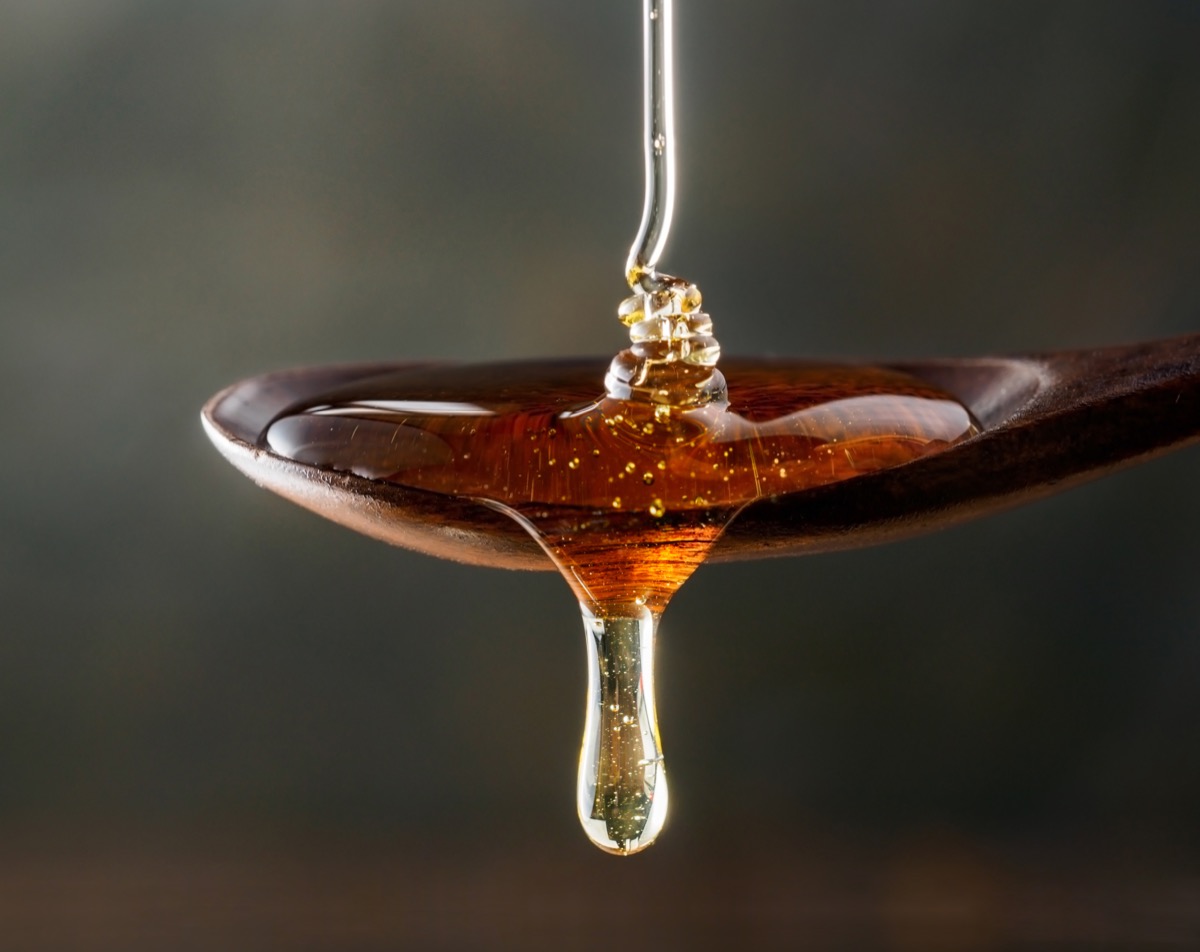
Another home remedy for itchy mosquito bites is hiding in your pantry. "Raw honey contains antibacterial and anti-inflammatory properties that make it a popular pick for many home remedies, particularly for soothing itchy bites," Jaques explains.
Crumbley adds that "there is considerable variation of antibacterial activity among types of honey, but many people enjoy using honey as an anti-inflammatory."
In fact, research points to a wide range of medicinal benefits associated with applying honey to the skin.
"The healing property of honey is due to the fact that it offers antibacterial activity, maintains a moist wound condition, and its high viscosity helps to provide a protective barrier to prevent infection," says a 2012 study published in the journal Dermatology Research and Practice.
4
Basil
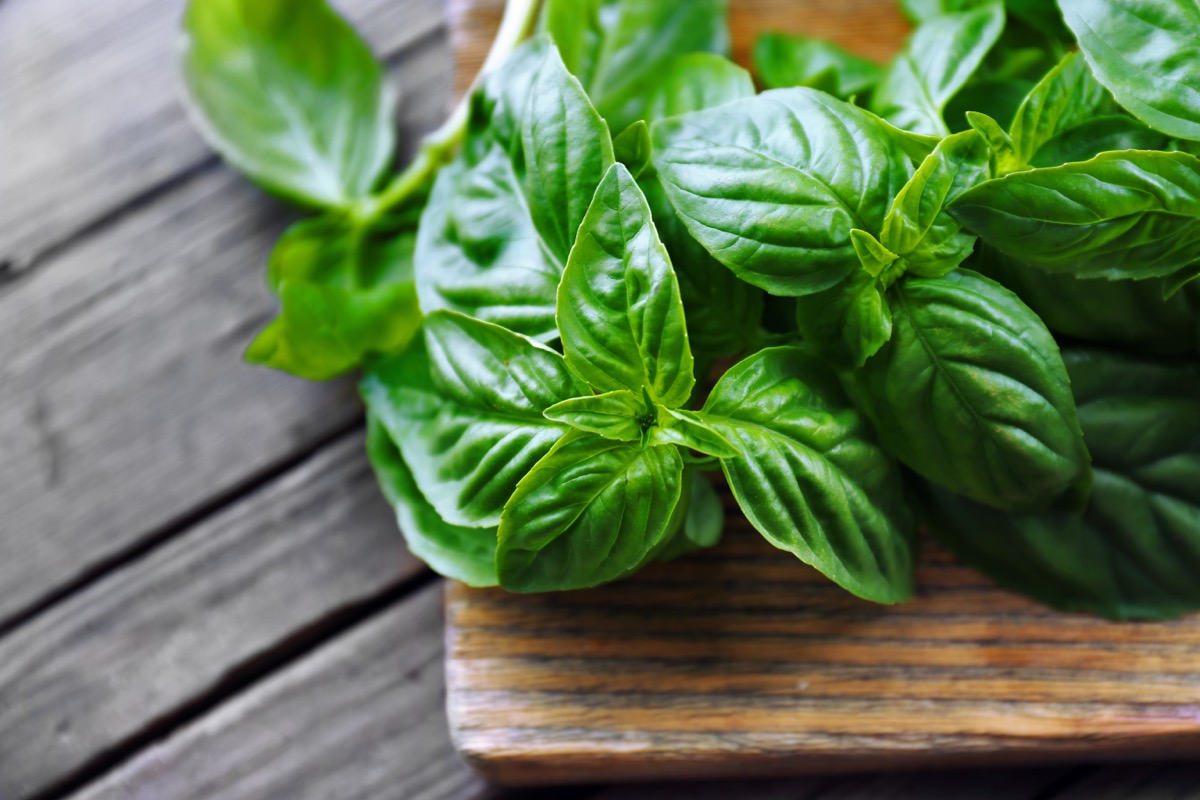
Next, Jaques recommends using fresh basil as a topical treatment for itchy mosquito bites.
"You can chop some fresh basil leaves up until very fine and rub them onto your skin. Crushed basil leaves are natural itch relievers because they contain thymol and camphor," she says.
Basil leaves also double as bug repellant. "Basil plants emit a strong aroma that repels mosquitoes and flies," Stephen Sullivan, the editor at Plant Native, tells Best Life. "Keeping a potted basil plant indoors can help keep these pests away."
For more wellness tips sent directly to your inbox, sign up for our daily newsletter.
5
Oatmeal
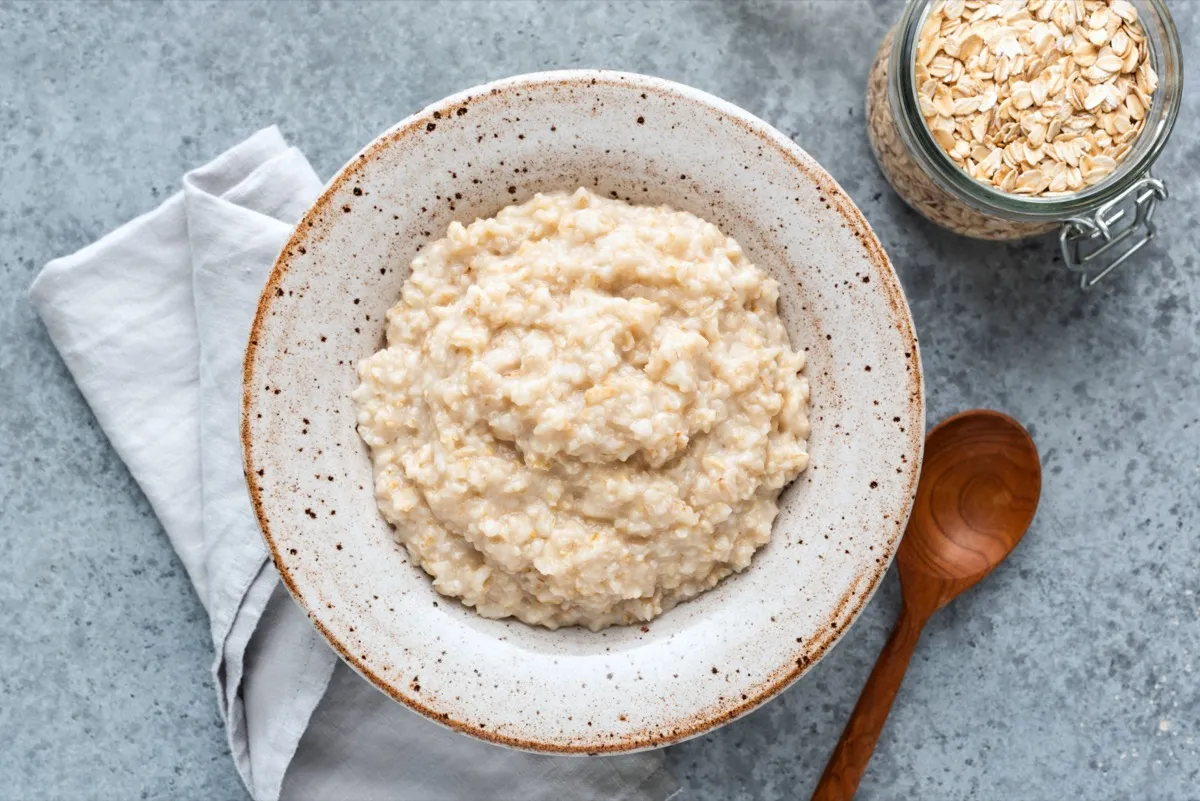
Oatmeal acts as "an itch reliever and a skin barrier," making it a great treatment option for mosquito bites, according to Cohen.
"The best way to use oatmeal to treat your mosquito bites is to grind it into a fine powder (colloidal oatmeal) in a blender or food processor," advises the Cleveland Clinic. "Mix the oatmeal powder with warm water until it becomes a thick, sticky paste."
Then, they say to let this paste sit on your bite for 10 minutes before wiping it off.
6
Chamomile tea

That box of chamomile tea in your pantry can do a lot more than help you sleep. According to the Cleveland Clinic, the tea contains dried chamomile flowers, which contain the natural chemicals terpenoids and flavonoids, both of which "have antioxidant and antihistamine properties."
To use this method, they advise letting a tea bag steep for a least 20 minutes. Squeeze the bag of excess water and then apply it to your itchy bite for at least 10 minutes.
"Put the wet tea bag in a container in your refrigerator so that you can reuse it on your bites throughout the day," they suggest.
READ THIS NEXT: Malaria Returns to the U.S. for the First Time in 20 Years—How to Stay Safe.
7
Mouthwash with an alcohol base
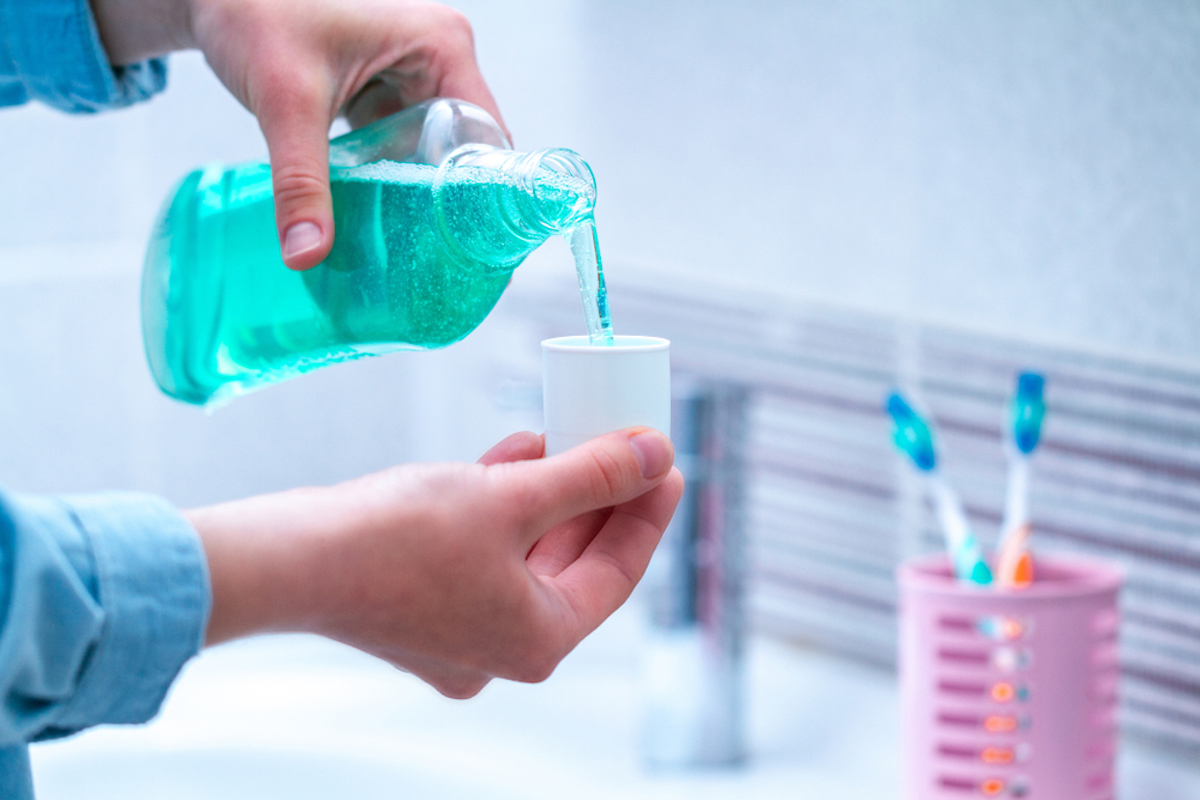
Jaques also says that dabbing an itchy mosquito bite with a bit of mouthwash can help soothe your discomfort. She explains that "menthol is the active ingredient that cools the skin, providing some relief."
(Alcohol-based mouthwash like Listerine has also been widely reported to repel mosquitoes.)
If your itchy bites don't improve using home remedies, consider asking your doctor about alternatives.
"It's worth noting that each person's experience with these treatments may be unique. A doctor or dermatologist should be consulted for specific recommendations," says Cohen.
